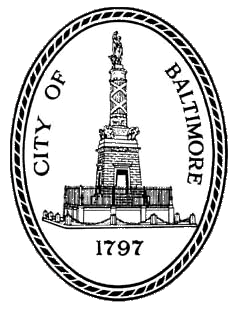
Frederick Douglass and Thurgood Marshall
A Maryland State Archives, Maryland Historical Trust, Baltimore Heritage Research Collaborative

 Frederick
Douglass (1817 - 1895), and Thurgood Marshall (1908 - 1993), two of America's
towering historical figures, serve as examples of black Baltimore personified.
Douglass, a migrant slave in the city, received his life's education on
the streets and from the people of black Baltimore during the 1820s and
1830s. His Baltimore experience shaped his life. His life shaped nineteenth
century American History. Likewise, a full century later, the young native
Baltimorean, Marshall, was shaped by the experience of being a part of
the black Baltimore community. Both men were products of this community,
though their Baltimore realities were separated by nearly a century. What
continuity is documentable in Baltimore which could produce a Thurgood
Marshall nearly a century after it had produced a Frederick Douglass? What
changes occurred in this elapse of time as well? These are the questions
and ideas at the foundation of The Road From Frederick To Thurgood.
Frederick
Douglass (1817 - 1895), and Thurgood Marshall (1908 - 1993), two of America's
towering historical figures, serve as examples of black Baltimore personified.
Douglass, a migrant slave in the city, received his life's education on
the streets and from the people of black Baltimore during the 1820s and
1830s. His Baltimore experience shaped his life. His life shaped nineteenth
century American History. Likewise, a full century later, the young native
Baltimorean, Marshall, was shaped by the experience of being a part of
the black Baltimore community. Both men were products of this community,
though their Baltimore realities were separated by nearly a century. What
continuity is documentable in Baltimore which could produce a Thurgood
Marshall nearly a century after it had produced a Frederick Douglass? What
changes occurred in this elapse of time as well? These are the questions
and ideas at the foundation of The Road From Frederick To Thurgood.
Any discussion of Baltimore's historic black communities must begin with East Baltimore. From early on, black Baltimoreans, slave and free, worked in the many industries which made the city a vital center of American commercial activity during the eighteenth and nineteenth centuries. Much of this activity, particularly that which involved shipping and ship building, occurred in the eastern part of the city, around the harbor. By the late-nineteenth century, as occupational diversity, population increase, and industrial development occurred, blacks began an intra-city migration to West Baltimore. There they continued to nourish the institutions and organizations which had served them well in the past.
Visitors to Baltimore today are not likely to see many remnants of the
city's rich black heritage. Due to natural disaster, urban renewal programs,
and our general ignorance of the past, a relative handful of African American
historical sites exist. However, using the World Wide Web, the Maryland
State Archives, the Maryland
Historical Trust, and Baltimore Heritage seek to uncover, salvage,
and introduce a significant segment of the city's black history to the
citizens of Baltimore and the world. College
interns conducted the majority of the research with the assistance
of high school students from public and private schools. However, we would
like to acknowledge the contributions of the many historians and genealogists
who have contributed to our understanding of this subject, including Leroy
Graham, Agnes Callum, and David Terry. Mr. Terry, a graduate student at
Howard University and an instructor at Morgan State University has been
particularly helpful in shaping this on-going study.
|
|
|
|
|
|
|
|
|
Through the Eyes of the Afro-American |
|
IMPORTANT NOTICES
This web presentation is best viewed with software supplemental to your web-browser. The documents in Portable Document Format require a free Adobe software package available from adobe.com. Documents shown as individual GIFs linked to the text can be studied in more detail using a helper application graphics program.
This website is part of an on-going research project at the Maryland State Archives, supported by the Maryland Historical Trust, Baltimore Heritage, and other sponsors. If you have any recommendations or additional information you would like to share regarding African-American historical sites in Baltimore, or about the biographical sketches found here, we encourage suggestions. This study can only be successful if archivists work with scholars, private citizens, collectors, genealogists and the public to share our understanding of the past.
 |
 |
|
Tell Us What You Think About the Maryland State Archives Website!
|